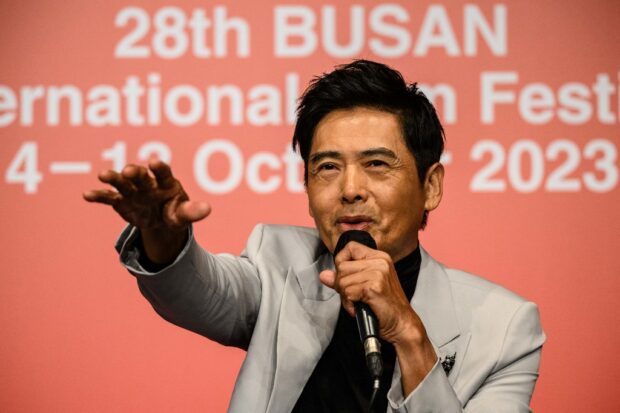Chow Yun-fat laments Chinese censorship at Busan film fest

Hong Kong actor Chow Yun Fat gestures during a press conference at the 28th Busan International Film Festival (BIFF) in Busan on Oct. 5, 2023. ANTHONY WALLACE / AFP
BUSAN, South Korea—Hong Kong film legend Chow Yun-fat on Thursday lamented China’s “difficult” censorship while conceding the mainland market’s crucial financial importance for filmmakers.
Speaking at South Korea’s Busan International Film Festival (BIFF), Chow told reporters that Hong Kong’s cinema industry had to learn to play by a new set of rules since the city returned to China’s control in 1997.
“We have a lot of censorship requirements in mainland China. Our scripts must go through a lot of different departments for the film bureau,” BIFF’s Asian Filmmaker of the Year honoree said.
But while Chow said things were “very difficult” for Hong Kong’s filmmakers, they also knew it was necessary to reach the “huge” mainland Chinese audience to “make a living.”
“We have to pay attention to our government … otherwise it is very hard to get the money to shoot a movie,” he said, adding they still strove to maintain the “Hong Kong spirit.”
Article continues after this advertisementIn announcing this year’s honor, BIFF organizers heaped praise on Chow for “spearheading the golden age of Hong Kong cinema” that flowered in the early 1990s, and making “Hong Kong noir” a globally recognized genre.
Article continues after this advertisementThree of Chow’s films—”A Better Tomorrow” (1986), “Crouching Tiger, Hidden Dragon” (2000) and 2023’s “One More Chance”—will be screened at the festival.
Freedom
Along with Tony Leung, his “Hard Boiled” co-star and 2022 BIFF honoree, Chow has long been a well-liked figure in South Korea thanks to Hong Kong cinema’s surge in popularity in the 1990s.
Since then, South Korea has cemented its own status as a global cultural powerhouse, and has had explosive successes like Oscar-winning film “Parasite” and the Netflix series “Squid Game.”
“It’s a good thing that when one industry feels stagnant and unable to move forward, another region can take it even further,” Chow said, when asked about the rise of South Korean cinema.
“I believe the greatest strength of Korean cinema lies in its freedom.”
Despite his prolific career and global fame, Chow said he still considers himself an “ordinary person.”
In 2018, he vowed vowed to donate his fortune to charity after he dies.
Chow quipped Thursday that it was his wife’s decision, but added: “I believe that since I came into this world with nothing, it doesn’t really matter if I leave with nothing as well.” /ra